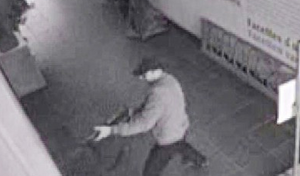TerrorismCounter-ISIS campaign must include a robust effort to stop Westerners from joining it: Experts
President Barack Obama last night outlined a 4-step strategy to defeat the Islamic State (IS). Administration officials indicated that the campaign against IS might take up to three years. Counterterrorism experts say that while the United States and its allies engage IS militarily, they must address the growing threat of young radicalized Western Muslims, many of whom have traveled to join the terrorist organization in Syria or Iraq.

Security camera captures Mehdi Nemmouche in attack at Jewish Museum in Brussels // Source: citinews.net
President Barack Obama last night outlined a 4-step strategy to defeat the Islamic State (IS). In the hours before the president’s speech, administration officials indicated that the campaign against IS might take up to three years.
Counterterrorism experts say that while the United States and its allies engage IS militarily, they must address the growing threat of young radicalized Western Muslims, many of whom have traveled to join the terrorist organization in Syria or Iraq. These recruits may well stage their own acts of terror once they return to their home countries, and do so with or without instructions from IS commanders.
Their passport and citizenship status would make many of them undetectable through formal surveillance or intelligence gathering.
The Daily Beast tells the story of a 29-year-old French citizen Mehdi Nemmouche, who on 24 May, walked into a Jewish museum in Brussels and killed four people. Prior to Nemmouche’s attack in Brussels, he was reported to have acted as one of the jailors of French hostages held in Syria in 2013, and possibly of American journalists James Foley and Steven Sotloff.
Nicolas Hénin, one of the journalists held hostage by IS, upon release reported to the French press that while a jailor, Nemmouche bragged about plans to attack the 14 July Bastille Day parade in Paris.
Fortunately, Nemmouche was arrested by customs officials when he boarded a bus en route from Amsterdam to Marseilles shortly after his attack in Brussels. When officials searched his luggage at the Marseilles point of arrival, they found a Kalashnikov with a retractable stock and 261 bullets; a .38 revolver with fifty-seven bullets; a black hood; a pair of black gloves; a gas mask; a white bed sheet with the words “Islamic State in Iraq and al-Sham,” written in Arabic, and a Go-Pro camera to record his exploits.
Nemmouche, who is now awaiting trial in Belgium, exemplifies the difficult-to-manage IS threat — young, not very religious, violent Jihadists who join the terrorist organization to gain a sense of self identity or make a name for themselves. The large numbers of Westerners who traveled to Syria in 2012 and 2013 to join IS and fight the Assad regime, did so because IS “provides an opportunity to live in a caliphate and to be on the winning side as opposed to being on the run,” says terrorism expert Brian Jenkins. “But unlimited violence — the chance to avenge past insults, to fulfill every violent fantasy — is obviously what ISIS propaganda thinks will resonate most with its potential recruits. And recruits attracted by violence are precisely the kind ISIS is most likely to now get,” Jenkins added.
Nemmouche offers an example of yet another difficulty in dealing with IS Western recruits: how to identify and deal with a free-lancer. French criminologist Alain Bauer notes that before his attack in Brussels, Nemmouche had fallen out with IS, adding that IS commanders considered him unreliable. “ISIS did not like him at all,” Bauer said.
Nemmouche thus represents an aspect of the terrorist threat to which law enforcement will have to find an answer. Jihadists like him may act without instructions from leaders of the terrorist organization o which they currently or formerly belonged. Counterterrorism experts have noted that before his attack in Brussels, Nemmouche was on a French watch list, but he was still able to travel throughout Europe without detection.
More than 700 IS fighters are French citizens who may still be able to travel within Europe. They represent “the biggest threat that the country faces in the coming years,” said French prime minister Manuel Valls.
